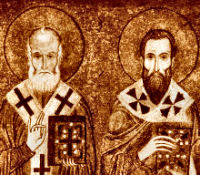A bit late in coming, but my homage to St. Thomas for today. This post originally ran two years ago.
"Blessed be the Lord; for love of him St. Thomas Aquinas spent long hours in prayer, study and writing." (Lauds, Jan. 28th)

St. Thomas Aquinas is a favorite in our family, so we will certainly be praying the full office in his honor, using the common for doctors of the Church. My husband's degree is in Thomistic philosophy, and we'll be sending a third child to Thomas Aquinas College next year to study the same.
I'm not a scholar, but whenever I dip into the Summa, I am impressed and delighted at St. Thomas' method of setting out a question, stating objections, and then giving g his reasoned conclusion. I love GK Chesterton's biography of St.Thomas, which you can get for only $2 on Kindle. What stands out in St. Thomas' life, even more than his intellect, is his purity, and I don't mean just in the chastity sense, but pure as in single-hearted. He had no interest in his academic reputation or importance or career. All he cared about was Truth.
St. Thomas reasoned and wrote about thousands of topics. These ranged from sublime to practical. Book II of the Summa deals with the moral and spiritual life. One section, "Of the remedies for sorrow or pain"(Part I Q.38), contains much of the same advice that we still see today when we open those magazines whose covers promise " Simple Ways to Lift Your Mood". St. Thomas recommends that we:
1. Vent a bit:"tears and groans assuage sorrow... a hurtful thing hurts yet more if we keep it shut up."
2. Indulge yourself in some way:"sorrow is driven out by pleasure"
3. Take a hot bath and get a good night's sleep: "sorrow,by its nature, is contrary to the vital movement of the body; and consequently whatever restores the bodily nature to its due state of vital movement, is opposed to sorrow and assuages it."
5. Talk to a friend:"when a man's friends condole with him, he sees that he is loved by them and this affords him pleasure."
Last and not usually mentioned in today's articles:
6. Contemplate the Truth: "And therefore, in the midst of tribulations, men men rejoiced in the contemplation of divine things and of future happiness...in the powers of the soul there is an overflow from the higher to the lower powers; and accordingly,the pleasure of contemplation overflows so as to mitigate even that pain which is in the senses."
All in all, great advice to help you forget your troubles and get us through the dreary days of winter. Now I think I'll take a bath, have some hot chocolate, and go get a good night's sleep. I'll save contemplating the truth for the next hour of the liturgy.
"Blessed be the Lord; for love of him St. Thomas Aquinas spent long hours in prayer, study and writing." (Lauds, Jan. 28th)
St. Thomas Aquinas is a favorite in our family, so we will certainly be praying the full office in his honor, using the common for doctors of the Church. My husband's degree is in Thomistic philosophy, and we'll be sending a third child to Thomas Aquinas College next year to study the same.
I'm not a scholar, but whenever I dip into the Summa, I am impressed and delighted at St. Thomas' method of setting out a question, stating objections, and then giving g his reasoned conclusion. I love GK Chesterton's biography of St.Thomas, which you can get for only $2 on Kindle. What stands out in St. Thomas' life, even more than his intellect, is his purity, and I don't mean just in the chastity sense, but pure as in single-hearted. He had no interest in his academic reputation or importance or career. All he cared about was Truth.
St. Thomas reasoned and wrote about thousands of topics. These ranged from sublime to practical. Book II of the Summa deals with the moral and spiritual life. One section, "Of the remedies for sorrow or pain"(Part I Q.38), contains much of the same advice that we still see today when we open those magazines whose covers promise " Simple Ways to Lift Your Mood". St. Thomas recommends that we:
1. Vent a bit:"tears and groans assuage sorrow... a hurtful thing hurts yet more if we keep it shut up."
2. Indulge yourself in some way:"sorrow is driven out by pleasure"
3. Take a hot bath and get a good night's sleep: "sorrow,by its nature, is contrary to the vital movement of the body; and consequently whatever restores the bodily nature to its due state of vital movement, is opposed to sorrow and assuages it."
5. Talk to a friend:"when a man's friends condole with him, he sees that he is loved by them and this affords him pleasure."
Last and not usually mentioned in today's articles:
6. Contemplate the Truth: "And therefore, in the midst of tribulations, men men rejoiced in the contemplation of divine things and of future happiness...in the powers of the soul there is an overflow from the higher to the lower powers; and accordingly,the pleasure of contemplation overflows so as to mitigate even that pain which is in the senses."
All in all, great advice to help you forget your troubles and get us through the dreary days of winter. Now I think I'll take a bath, have some hot chocolate, and go get a good night's sleep. I'll save contemplating the truth for the next hour of the liturgy.


